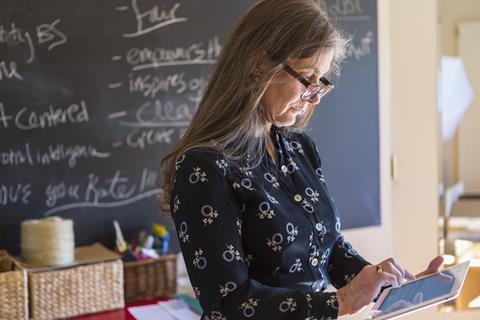To ensure successful outcomes for students, teachers need to take care of their own success by constantly developing their skills
From swapping ideas with colleagues over a brew to inviting an expert to workshop a new approach, there are plenty of ways to develop your skills, boost your department’s collaboration and, ultimately, improve students’ experience of science. We canvassed teachers, ex-teachers and the EiC team for seven simple ideas to do just that.
1. Engage students with industry
Reach out to local industry and get them working with your students. You could build links with local companies; start by asking interested parents where they work and if they’d be interested, or seek out alumni, who work nearby.
An engineer or chemist could give a careers talk, promoting STEM careers and science learning; a local business could offer a guided tour to put science lessons into context.
2. Work with technicians
Explore a new approach to practical lessons with your school’s technician. The technician could demonstrate the practical to your class, while you assist individuals. Workshop the approach with your fellow teachers and technician so you iron out the details before taking it into the classroom. Could you share this approach across the department?

3. Share knowledge and master new topics
How do you pool knowledge within your department? Your school? Other local secondary schools? Everyone has their pet topic or specialism. Arrange a series of masterclasses and you can share that insight and expertise.
If the English department uses social media to engage with A-level students, ask one of them to tell you how they started. Share the load with colleagues and other local teachers by collaborating; it’s easy with advice from an existing collaboration.
4. Network with local primary schools
Networking isn’t simply about your own professional development, it’s also a great way to build links with other local schools. They don’t just have to be secondary schools either. Why not talk to the local primary schools to see if you can help them develop their science teaching, maybe demonstrating microscale experiments for use with their pupils. And if their pupils then come to your school, you know they’ve already got some practical knowledge.
5. Invite someone in to talk to you
Visitors are always welcome. Invite experts to workshop a new approach or technique. That could be an education coordinator from the Royal Society of Chemistry demonstrating a practical or a policy adviser discussing what the proposed new Ofsted framework means for you.
6. Continue your professional development
From informal mentoring over a cuppa or a pint to attending conferences, it’s all important. These two options might seem like complete opposites, but there are middle-of-road options. When a colleague has been to a conference, explore how they might disseminate what they learned with the whole department, or school.
Set up mentoring or coaching groups, within your department and with other schools. You could even sit in on colleague’s lessons, gaining valuable insight into how others approach everything from titration to behaviour.
7. Become money-saving experts
Whether you’re the head of department or a newly qualified teacher, budget can be a limiting fact. Don’t let it be. Investigate ways to operate on a shoestring. Technicians might be able to repair and maintain equipment; display a worksheet in class rather than printing one per student; use informal modelling materials instead of buying expensive molecular modelling kits – and there are sound teaching reasons as to why this is a good idea.
And sometimes a bit of help from outside won’t go amiss. The Chemistry Teaching Event Empowerment Fund can help with financial support and advice from your local Royal Society of Chemistry education coordinator.
This isn’t an extensive list. We could go on and on and on … Share your ideas on Twitter @rsc_eic









No comments yet